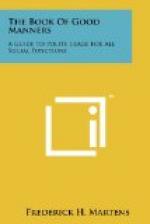Cards should
be engraved in plain letter,
according
to prevailing fashion.
Facsimile
cards engraved are no longer
used.
Written cards are in bad taste, but in case of necessity they may be used. The name should be written in full if not too long, and should be the autograph of the sender.
Messages or writing should not appear on men’s cards. If address is changed, new cards should be engraved. In an emergency only the new address may be written.
Mourning cards are the same
size as visiting-
cards, and
a black border is used—the width
to be regulated
by the relationship of the
deceased
relative.
Men—style, titles.
Men having titles use
them before
their names—as, Reverend, Rev.,
Mr., Dr.,
Army and Navy titles, and officers
on retired
list. L.L.D. and all professional
titles are
placed after the name. Political
and judicial
titles are always omitted.
Physicians may use Dr. before or M.D. after the name. On cards intended for social use, office hours and other professional matter are omitted.
Mr. And Mrs. See Mr. And Mrs. Cards.
P. P. C. See P. P. C. Cards.
Sending by mail or
messenger. If after
accepting
an invitation it is necessary to
decline,
a card should be sent the evening of
the entertainment,
with an explanatory note
the day
following.
When an invitation has been received to an “At Home” debut, and one has not been able to attend, cards should be sent by mail or messenger, to arrive at the time of the ceremony.
A card should
be mailed to a man engaged
to be married.
Afternoon teas. The invitations
to a formal
afternoon
tea are sent a week or ten days in
advance
by mail or messenger. No reply is
necessary,
but if unable to be present, a card
should be
sent the day of the entertainment.
For an afternoon tea a visiting-card may be used, with the hour for the “tea” written or engraved over the date beneath the fixed day of that week. They may be sent by mail or messenger.
Persons
unable to attend should send cards
the same
afternoon.
Birth (announcement). If
wishing to congratulate
after a
birth, cards should be left in
person or
sent by a messenger. Cut flowers
may be sent
with the card.
Condolence. After a death in
the family of
an acquaintance,
a card with the word
Condolence
written on it should be left in person or
by messenger.
For very intimate acquaintances,
cut flowers
may be left in person or
sent, together
with a card or letter.




